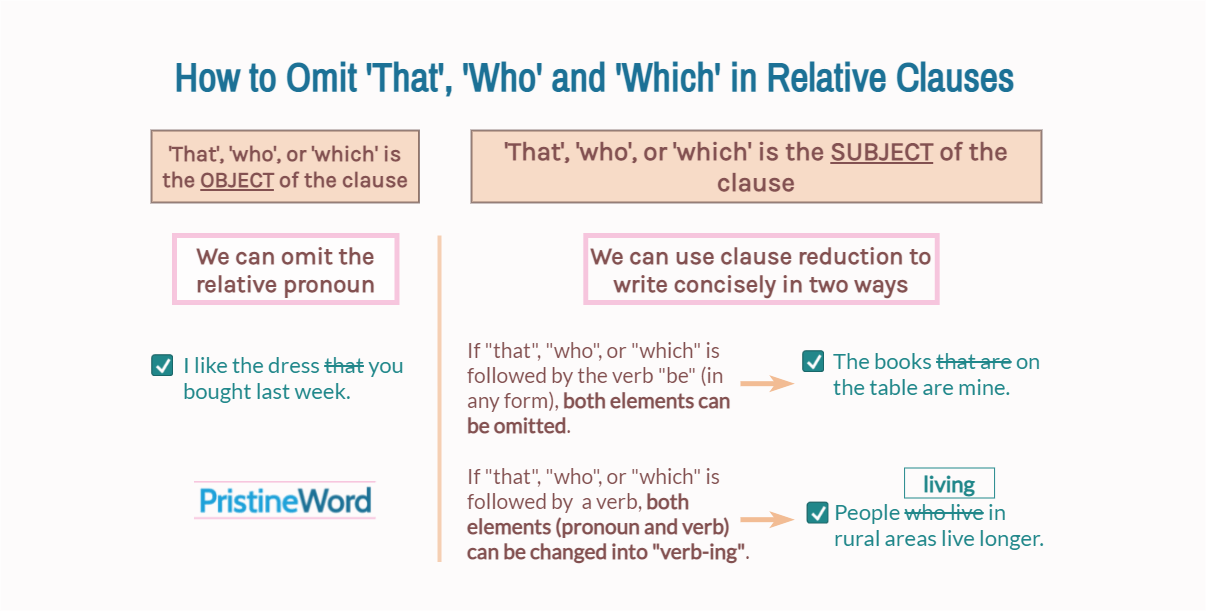There are two different types of situations where you can omit the relative pronouns "that", "who", or "which" in English.
There are two different situations where you can omit the relative pronouns that, who, or which in English.
- When that, who, or which is the object of the clause, we can leave out the relative pronoun.
The book that I'm reading is fascinating.
The book I'm reading is fascinating.
The subject of the relative clause ("that I'm reading") is "I", and the relative pronoun "that" (the book) functions as the object of the clause.
Look at this sentence.
The waiter who served us yesterday was rude.
The subject of the relative clause is who (the waiter), so we cannot leave out the relative pronoun. However, we can omit it in another way (see step 2).
The waiter served us yesterday was rude.
- When the relative pronoun is the subject, we can omit that, who, or which in two basic ways:
- If that, who, or which is followed by the verb "be" (in any form), both elements can be omitted.
The keys that are on the table are mine.
The keys on the table are mine.
- If that, who, or which is followed by a verb, both elements (pronoun and verb) can be changed into "-ing" form of the verb.
People who follow healthy diets tend to live longer.
People following healthy diets tend to live longer.
- If that, who, or which is followed by the verb "be" (in any form), both elements can be omitted.
Contents
1. Should We Omit the Relative Pronoun?
Omitting the relative pronouns that, who, or which is optional. However, long sentences with too many words can confuse the reader or feel overwhelming.
By contrast, concise writing enhances the clarity of your sentence and helps you communicate more effectively. Using reduced relative clauses can help writers achieve this goal by omitting unnecessary words.
Mary likes the people that she works with.
Mary likes the people she works with.
The following sentence uses clause reduction by taking out the relative pronoun and the verb "be".
The money that is in the wallet is mine.
The money in the wallet is mine.
This example shows how to use clause reduction by changing the verb into the "-ing" form:
People who live in rural areas tend to live longer.
People living in rural areas tend to live longer.
2. The Position of Prepositions in Relative Clauses
Note the position of prepositions (for, to, in, at, by, etc.) in relative clauses:
- The hotel (that) I stayed in last night was really expensive.
- Peter is somebody (who/that) you can rely on.
- What's the name of the restaurant (that) you told me about?
- Did you get the job (that) you applied for?
- Are these the keys (that) you were looking for?
- Do you know the name of the girl (who) John is talking to?
- We couldn't go to the party (that) we were invited to.
- Who is that girl (that/who) I saw you with in the park?
3. More Examples (Omitting the Relative Pronoun as the Object)
- I like the dress you bought last week.
- I can't remember the name of the movie I watched on Sunday.
- The chocolate you bought yesterday is too sweet.
- I've just found the wallet I had lost yesterday.
- The shirt I want is too expensive.
- The girl I met yesterday is really cute.
- The woman I was sitting next to on the bus was constantly invading my space.
- Some of the people you invited didn't come.
- The computer your brother bought is running slow.
4. More Examples (Omitting the Relative Pronoun as the Subject)
Example 1
Computers that run slow use more energy.
Computers running slow use more energy.
Example 2
The bridge that is near the hotel is impressive.
The bridge near the hotel is impressive.
Example 3
The girl who speaks English is very tall.
The girl speaking English is very tall.
Example 4
The books that are on the table belong to my friend.
The books on the table belong to my friend.
Example 5
A software engineer is someone who applies the principles of engineering to the design and maintenance of computer software.
A software engineer is someone applying the principles of engineering to the design and maintenance of computer software.
5. Conclusion
You can follow these guidelines to make your writing more concise by omitting the relative pronouns:
- Look for relative pronouns in your text. Keep in mind that not all clauses containing that, who or which are relative clauses. Make sure that the clause modifies a noun before leaving out the relative pronoun.
- Take out the relative pronouns that function as the object of the clause.
- If that, who or which is the subject of the relative clause, consider using clause reduction by:
- omitting the relative pronoun and the verb "be", or
- replacing the relative pronoun and the verb by its "-ing" form.
Finally, make sure you are using commas correctly by reading our post on the use of commas with that, who, and which.

